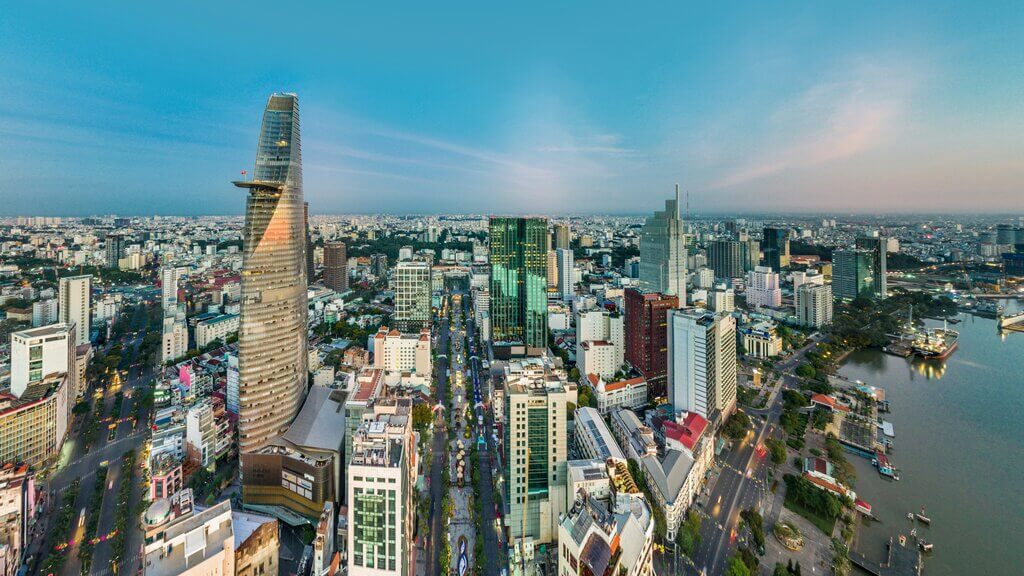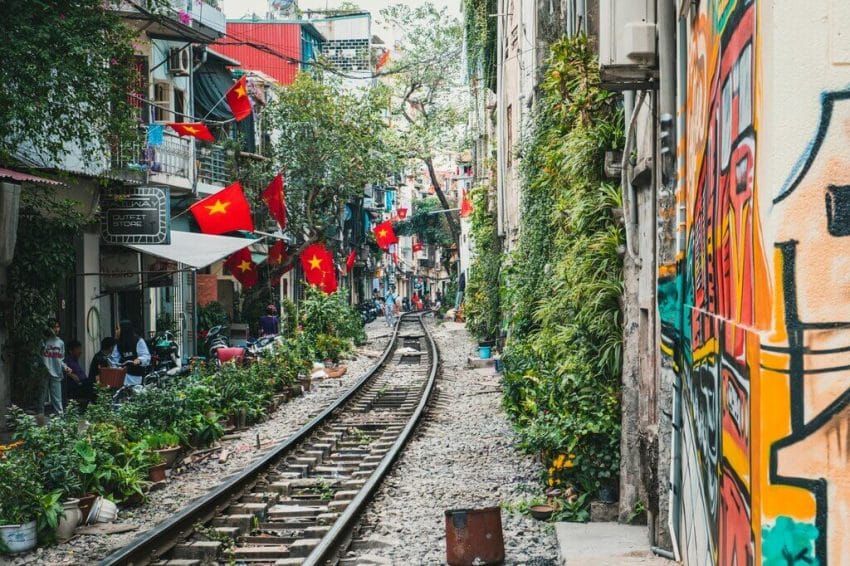Vietnam’s economy is experiencing significant growth and is expected to grow 29.7% in the upcoming five years, making it an attractive destination for real estate investors. The strong and increasing demand for properties in the country has the potential to lead to higher property values and rental yields. This guide will provide detailed information on how foreigners can buy a house in Vietnam.
Can foreigners buy property in Vietnam?
Foreigners are allowed to buy buildings and structures on land in Vietnam. However, they cannot own the land itself, as all land in the country is owned by Vietnamese citizens and distributed by the government. Foreigners looking to buy a house in Vietnam cannot have freehold ownership of land but can own buildings or structures through a leasehold arrangement.
The leasehold arrangements usually go up to a lease of a maximum of 50 years, with the possibility of renewal. Leasehold is closest to property ownership a foreigner can get in Vietnam.
Many Asian countries don’t allow foreigners to own land. In those countries, foreigners can buy land through a corporation, which they can establish themselves. Vietnam, in contrast, doesn’t allow foreigners to buy land through a company. Foreign businesses can lease the land for investment purposes.
What properties can foreigners own?
Foreigners are generally permitted to purchase apartments in commercial housing projects. Foreigners can own a maximum of 30% of units within a single apartment building. Additionally, foreigners are allowed to own up to 250 houses or apartments.
How to buy a house in Vietnam in 7 steps
To buy a house in Vietnam, the following steps can be followed:
Step 1: Research the property market
Begin by researching the Vietnamese market and familiarize yourself with regulations regarding foreign ownership.
Step 2: Select a property
Search for properties through online property portals, real estate agents, or by visiting areas that interest you.
Step 3: Engage a real estate agent
Due to the complexities of the Vietnamese market, it is advisable to seek assistance from an experienced local real estate agent specializing in assisting foreigners.
Step 4: Conduct due diligence
Inspect ownership documents, property details, and other relevant information to ensure compliance with local regulations.
Step 5: Negotiate
Once you have found a suitable property, negotiate terms and prices with the seller.
Step 6: Sign a deposit agreement
To secure the property, sign a deposit agreement and pay a deposit typically amounting to 10% of the property’s value.
Step 7: Finalize the purchase
The last step to buying a house in Vietnam is to complete the transaction by paying the remaining 90%, signing a Sales and Purchase Agreement (SPA), and applying for the Pink Book, which serves as proof of land use rights and ownership.
What is the Pink Book in Vietnam?
The Pink Book, also known as the Certificate of Land Use Rights and Ownership of House and Other Assets Attached to Land, is a legal document that confirms an individual’s right to use land and ownership of any structures on it. It contains information regarding land usage terms, conditions, and property details.
What are the requirements for a long-term leasehold in Vietnam?
To lease land in Vietnam long-term, foreigners must adhere to Vietnamese law, specifically the Land Law and the Law on Housing. Foreign individuals or companies can enter into leases for up to 50 years, with the possibility of extensions. The following criteria must be met for a long-term leasehold in Vietnam:
- Purpose of lease: The intended use of the leased land must be clearly specified in the lease agreement, whether it is for residential purposes, business activities, or investment ventures.
- Documentation: Foreign individuals must provide valid passport and visa documents, while foreign companies must submit their business registration documentation.
- Lease approval: The lease agreement must receive approval from the relevant Vietnamese authorities before it becomes legally binding.
- Payment terms: The terms and conditions regarding payment should be included in the lease agreement.
- Compliance with Vietnamese laws: Foreigners must comply with all applicable Vietnamese laws during the lease term.
- Lease registration: It is necessary to register the lease with the land registration office in Vietnam to ensure its validity and legal recognition.
- Lease renewal: The conditions of lease renewal should be clearly stated in the initial lease agreement.
By adhering to these requirements, foreigners can engage in long-term leases within Vietnam while ensuring compliance with local regulations and legislation.

What documentation do you need when you buy a house in Vietnam?
Several documents are required to buy a house in Vietnam as a foreigner. Ensure you have the following documents for the real estate transaction:
- Passport with a Vietnamese visa,
- Certificate of Residence,
- Proof of Funds or a valid bank statement,
- Certificate of Ownership,
- Certificate of Ownership Registration,
- Certificate of Land Use and Construction,
- Certificate of Land Use and Construction Registration,
- Deed of Sale and Purchase.
What are the taxes and fees involved when buying a house in Vietnam?
The following taxes and fees are involved when you buy a house in Vietnam:
| Tax/fee | Description | Calculation | Who pays |
|---|---|---|---|
| Value Added Tax (VAT) | Paid on the transfer of the property | Usually 10%. Till June 2024 the VAT is reduced to 8% as an economic support measure | Buyer |
| Registration Tax | Tax for registering the property transfer at the Land Registry | 0.5% of the property value | Buyer |
| Personal Income Tax (PIT) | Tax rate on the resale of a property | 2% of the selling price of the property | Seller |
| Maintenance fee | Fee for maintaining development’s quality standards | 2% of the selling price of the property | Buyer |
| Notary fee | Paid to the notary who handles the transaction | Usually between 0.05% and 0.1% of the property value | Buyer and seller |
What is the house price in Vietnam?
House prices in Vietnam vary depending on location, property type, number of bedrooms, and market conditions. Generally, larger cities and economic centers have higher prices per square meter than rural areas. The following cities are popular for foreigners looking to buy a house in Vietnam and include the average prices per sqm for condos, apartments, and houses:
| City | Average condo price per sqm | Average apartment price per sqm | Average house price per sqm |
|---|---|---|---|
| Ha Noi | ₫ 41.78 million ($1,629) | ₫ 39.85 million ($1,554) | ₫ 102.9 million ($4,013) |
| Ho Chi Minh | ₫ 86.22 million ($3,362) | ₫ 96.3 million ($3,756) | ₫ 171.36 million ($6,683) |
| Da Nang | ₫ 66.61 million ($2,598) | ₫ 87.59 million ($3,416) | ₫ 96.24 million ($3,753) |
| Nha Trang | ₫ 62.49 million ($2,437) | ₫ 38.58 million ($1,505) | ₫ 40.69 million ($1,587) |
| Hai Phong | ₫ 37.7 million ($1,470) | ₫ 36.23 million ($1,413) | – |
What are 5 common risks when you buy a house in Vietnam as a foreigner?
Buying a house in Vietnam involves risks. Therefore, conducting thorough due diligence, consulting with local real estate experts, and engaging legal advisors are all important. Staying informed about the market trends and legal changes is also helpful. The following risks are common when you buy a house in Vietnam as a foreigner:
- Legal risks: Regulatory changes can impact the real estate market, so comprehensive research is essential.
- Land disputes: Conflicts arising from unclear land rights may lead to legal challenges and delays in property transactions.
- Fraud and corruption: Foreign investors should be cautious of scams involving misrepresented property details or fraudulent ownership documents.
- Lack of transparency: Limited transparency may make it difficult to verify information provided by sellers, increasing vulnerability to fraudulent activities.
- Communication barriers: Language differences and cultural disparities can pose challenges during the buying process; engaging a local real estate agent can help streamline communication.
Buy a house in Vietnam with Own Property Abroad
Do you want to buy a house in Vietnam? Or are you opting to buy land in Vietnam? Own Property Abroad can assist you and ensure a seamless and hassle-free property journey. Thanks to our extensive knowledge and local experience in the Vietnamese real estate market, we can help with legal requirements, finding suitable properties, negotiating the best deals, and conducting due diligence.
With our expert team, you won’t have to navigate the complexities of buying property in Vietnam alone. For further information on how we can assist you, kindly drop your details below or email us at hello@ownpropertyabroad.com. Let’s start working on your property success story today!
Frequently Asked Questions (FAQs)
Where to find Vietnam homes for sale?
To find homes for sale in Vietnam, you can explore the following options: Real estate websites, local real estate agencies, online marketplaces, social media groups, and local newspapers and magazines.
What is the pink book in Vietnam?
The Pink Book is a vital legal document in Vietnam, serving as the official record of property ownership and land use rights. It is an indispensable part of the country’s property ownership and real estate transactions.
Can foreigners buy land in Vietnam?
No, foreigners cannot buy land in Vietnam. Land in Vietnam is collectively owned by the people but managed and distributed by the state. Foreigners can only lease land for a period, typically up to 50 years, and can own buildings or structures on the land.
Can Americans buy property in Vietnam?
Yes, Americans can buy property in Vietnam through a leasehold arrangement, primarily in the form of apartments in condominium projects. However, they cannot own land. Property ownership is subject to certain conditions, such as limitations on the number of units in a condominium complex and the duration of ownership.
How much does it cost to live in Vietnam?
The cost of living in Vietnam varies depending on the city and lifestyle, but it is generally affordable compared to Western countries. On average, a single person’s monthly costs (excluding rent) are around $450 – $700. Rent varies from $250 to $1,000 monthly, depending on location and accommodation type. These approximate figures can differ based on personal lifestyle and location within Vietnam.
Is real estate in Vietnam profitable?
Investing in real estate in Vietnam can be highly profitable, as the country has seen an increase in tourist numbers over the last few years, which is expected to increase even further. Property owners can rent their property on platforms like Airbnb in Vietnam or sell it and take advantage of property appreciation.




2 Responses
This is a great overview of the process of buying home in Vietnam! So who can you find as reliable for advice and guidance in Vietnam?
Hello Shon, for reliable advice and guidance on buying a home in Vietnam, you can contact us directly via email at hello@ownpropertyabroad.com or WhatsApp us at +31 6 83506131. We are here to help with your property needs.